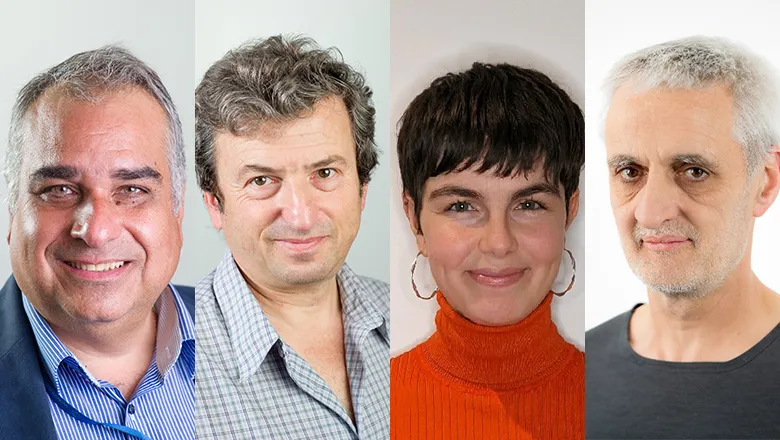Our department is one of excellence, from our early-career researchers to established professors, to the technical staff that make our experiments tick. I’d like to offer personal congratulations to all our winners”
Professor Ruth Gregory
16 October 2023
King's Department of Physics scoop four prestigious Institute of Physics Awards
Professors Lev Kantorovich, Nikolaos Mavromatos, PhD student Raquel Lopez-Rios De Castro and Technical Services Project Manager Bill Luckhurst have all received awards from the IOP

Academics, students and technical staff at King’s have been awarded a total of four prizes from the Institute of Physics (IOP), the leading body for practising physicists in the UK and Ireland, for their distinguished work in the field.
Covering honours from technician of the year to distinguished contributions in theoretical physics, each winner was nominated by members of the academic community in recognition of their contribution to the study of physics both in their institution and in the wider discipline.
Professor Ruth Gregory, Head of the Department of Physics, said “The awards announced today are a fantastic reflection of the hard work, drive and talent of each individual chosen by the IOP, but they are also illustrative of the community that we’re building here at the Department. It is one of excellence, from our early-career researchers to established professors, to the technical staff that make our experiments tick. I’d like to offer personal congratulations to all our winners”.
Bill Luckhurst – Technician of the Year
A technician at King’s for more than forty years and a recipient of a Lifetime Achievement Award from the Principal, Technical Services Project Manager Bill Luckhurst has been awarded the IOP’s Technician of the Year Award.
Awarded for his outstanding technical support and leadership in the development of research infrastructure at King’s, his nomination came from Dr Paul Le Long, Associate Director of Departmental Operations at the Faculty of Natural, Mathematical and Engineering Sciences. Formerly the Departmental Manager for the Department of Physics, Dr Le Long said of the nomination:
“I nominated Bill for this award because I feel he is the unsung, almost invisible, engine that keeps experimental Physics moving forward. Since 1979 almost every success enjoyed by experimentalists has been achieved either directly or indirectly because of Bill. I felt the time was right to acknowledge his importance and vital role, bringing his achievements and accomplishments to a wider audience.”
The Department of Physics and more recently Engineering, are like second homes to me. When I do decide to retire properly, I will greatly miss both departments and the colleagues and friends that I have so enjoyed working with.”
Bill Luckhurst
Reflecting on his win, Bill stated “My time spent supporting experimental Physics Research over many decades can best be described as sometimes challenging but always rewarding. The Department of Physics and more recently the Department of Engineering continue to open doors for me to develop my skills and career.
The Department of Physics and more recently Engineering, are like second homes to me. When I do decide to retire properly, I will greatly miss both departments and the colleagues and friends that I have so enjoyed working with.”
Of course, this award is not just mine as a lot of work I have been doing over the many years researching surface science has been done together with my research students, dedicated postdocs and collaborators. I’d also like to thank my family for being so patient with me over all these years, especially to my wonderful wife who has been supporting me along that path.”
Professor Lev Kantorovich
Professor Lev Kantorovich – David Tabor Medal and Prize
Professor Lev Kantorovich was awarded the Institute of Physics’ David Tabor Medal and Prize, for his groundbreaking work in surface physics. Given annually, the award recognises distinguished contributions to nanoscale and surface physics, having previously been awarded to figures such as Professor David Ritchie in 2008 and Professor Leigh Canham in 2021.
Professor Kantorovich received the prize for his work on new theories exploring kinetics of growth of molecular structures and molecular diffusion on two-dimensional surfaces. This is in addition to his theoretical work on how energy dissipates in atomic force microscopy (AFM), an imaging technique to probe surfaces and forces at the nanoscale, and how atoms and complex molecules create functional structures on surfaces in real time, including how graphene grows.
His efforts were instrumental in developing the first ever virtual AFM software, allowing scientists to run simulations of the actual AFM imaging process taking into account the electronics of the experimental device, in what is now an ubiquitious system in the community. He first recognised the importance of image interactions in AFM to explain Kelvin force microscopy, a tool that enables the measurement of local charge on a surface. His theories of the mechanisms of how to manipulate molecules on surfaces with AFM and scanning tunnelling microscopy (STM), and how to manipulate the charge of oxygen atoms and molecules on insulating surfaces using the tip of AFM/STM devices, set standards for future experiments using these techniques.
Reflecting on his award win, Professor Kantorovich said, “I am grateful to the IOP for giving my work such a high recognition and feel very honored for receiving this award. Of course, this award is not just mine as a lot of work I have been doing over the many years researching surface science has been done together with my research students, dedicated postdocs and collaborators. I’d also like to thank my family for being so patient with me over all these years, especially to my wonderful wife who has been supporting me along that path.”
“I feel deeply honoured and delighted to have received this prestigious award, and I would like to thank my collaborators over the years with whom I have developed partly the work that led to this prize.''
Professor Nikolaos Mavramatos
Professor Nikolaos Mavromatos – John William Strutt, Lord Raleigh Medal and Prize
The John William Strutt, Lord Raleigh Medal and Prize is awarded to those whose distinguished contributions have helped advance the field of theoretical, including computational and mathematical, physics. Professor Nikolaos Mavromatos joins previous winner Professor Benjamin Doyon from the Department of Mathematics (2022) for his work on quantum gravity.
Professor Mavromatos was nominated for his prize for the novel discovery that quantum gravity could modify how light interacts with the vacuum of space, a proposition that has led to a new arena of theoretical and experimental investigation.
By suggesting that photons emitted from far away cosmic sources such as gamma-ray bursts, immensely energetic explosions second only to the Big Bang, would be slowed dependent on their level of energy, Professor Mavromatos helped lay the foundation for further exploration on the quantum properties of spacetime.
Thanking those around him upon receiving the award, Professor Mavromatos said “I feel deeply honoured and delighted to have received this prestigious award, and I would like to thank my collaborators over the years with whom I have developed partly the work that led to this prize.''
On behalf of the Institute of Physics, I want to congratulate all of this year’s award winners. Each one has made a significant and positive impact in their profession, whether as a researcher, teacher, industrialist, technician or apprentice and I hope they are incredibly proud of their achievements."
Professor Sir Keith Burnett, Institute of Physics President
Raquel Lopez-Rios De Castro – Joceyln Bell Burnell Award and Medal
A PhD student in Theoretical Biophysics at the Department of Physics, Raquel Lopez-Rios De Castro was awarded the Jocelyn Bell Burnell Award and Medal for her work to improve the inclusivity and diversity of post-graduate research programmes in the UK, alongside her work in developing anti-cancer treatments. Named after Dame Jocelyn Bell who first discovered the ‘pulsar’ variant of the neutron star in 1967, the award is given to very early career female scientists who have already made excellent contributions in the field.
In addition to her work combining computer simulations with experimental biochemistry to design polymers to target cancerous cells, Raquel has played a leading role in increasing the visibility of women in STEM. First in her role in King’s Women in Physics student society, and then as the student head of the EDI committee of the London Interdisciplinary Doctoral Programme, she has led on a number of initiatives focussed on having honest conversations with students about academia. From speaking on topics such as misconduct in reporting procedures, supervisor biases, and the experience of minoritised groups, Raquel and other EDI committee members developed a paper to improve procedure for academic misconduct for UKRI.
Thanking those around her, Raquel said upon receiving her award "I am thrilled to have been awarded the Jocelyn Bell Burnell medal. I would like to thank my supervisors Professor Christian Lorenz and Professor Martin Ulmschneider for mentoring me throughout my PhD and always encouraging me to pursue projects within and outside of my PhD project. Additionally, I want to thank Dr Claire Russell for supporting our EDI initiatives and providing us with the necessary space to develop them."
I would like to thank my supervisors Professor Christian Lorenz and Professor Martin Ulmschneider for mentoring me throughout my PhD and always encouraging me to pursue projects within and outside of my PhD project. Additionally, I want to thank Dr Claire Russell for supporting our EDI initiatives and providing us with the necessary space to develop them."
Raquel Lopez-Rios De Castro
Adding his congratulations to this year’s Award winners, Institute of Physics President, Professor Sir Keith Burnett, said “On behalf of the Institute of Physics, I want to congratulate all of this year’s award winners. Each one has made a significant and positive impact in their profession, whether as a researcher, teacher, industrialist, technician or apprentice and I hope they are incredibly proud of their achievements.
“There is so much focus today on the opportunities generated by a career in physics and the potential our science has to transform our society and economy and I hope the stories of our winners will help to inspire future generations of scientists.”
Congratulations to all winners.




